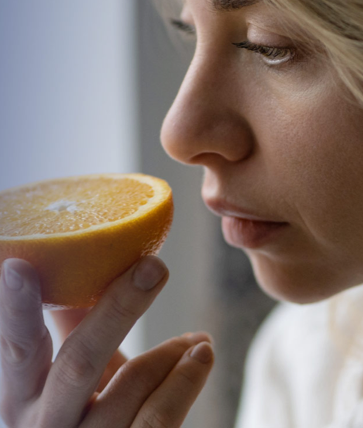Social and
Safety Implications
of Olfactory Dysfunction
hazardous events due to smell loss1
The loss of smell and taste, medically known as hyposmia and hypogeusia respectively, extends far beyond mere inconvenience. It affects our ability to enjoy life’s simple pleasures, like savoring a favorite meal or the scent of a blooming flower. However, the implications are much more serious than simply missing out on your morning coffee or a freshly baked pie. The safety concerns of smell loss highlight how deeply this condition can impact individuals, affecting their quality of life and overall well-being.
Safety Concerns of Smell Loss (Olfactory Dysfunction)



Our sense of smell plays a crucial role in alerting us to dangers in our environment.
The safety concerns of smell loss are not just hypothetical; they are real and potentially life-threatening. Our sense of smell serves as a critical early warning system, alerting us to dangers that are often invisible to the naked eye. Imagine not being able to detect the smoke from a fire or the rancid smell of spoiled milk—situations that most of us take for granted but are real concerns for those experiencing anosmia.
For those who love cooking, the loss of smell and taste can strip away the joy and satisfaction of preparing and sharing meals.
It can also lead to decreased appetite and nutritional deficiencies, as eating becomes less appealing without the ability to taste food. This can have a cascading effect on one’s health, leading to weight loss or malnutrition, further emphasizing the need for awareness and understanding of this condition.
Addressing hyposmia and hypogeusia requires a multifaceted approach. It’s essential to seek medical advice to determine the underlying causes, which can range from viral infections and sinus conditions to neurological disorders.
Social Impact of Olfactory Dysfunction
The loss of smell and taste, conditions known as hyposmia and hypogeusia, carry with them not only significant safety concerns but also substantial social implications.
These sensory impairments can profoundly affect one’s social interactions and overall enjoyment of life. When we think about the role that smell and taste play in our daily lives, it’s clear that their absence can alter personal relationships, social gatherings, and even cultural rituals centered around food and scents.
Imagine sitting down to a meal with friends or family, a common setting for bonding and making memories, and being unable to partake in the joy of the shared experience. The nuances of taste that spark conversations, the warmth of a freshly baked loaf of bread, or the comfort of a family recipe passed down through generations—all of these are lost to someone dealing with hyposmia and hypogeusia. This can lead to feelings of isolation, frustration, and even depression, as those affected may withdraw from social activities they once enjoyed.
The inability to detect taste nuances can also impact one’s confidence in social situations involving food or drink, potentially leading to anxiety about dining out or attending events where food plays a central role. The joy of exploring new cuisines or the simple pleasure of tasting a loved one’s cooking becomes a source of stress, rather than enjoyment or connection.
At Cyrano Therapeutics, we’re acutely aware of the profound impact that the loss of smell and taste can have on your social life and emotional well-being. That’s why we’re dedicated to advancing research and developing innovative treatments for smell loss. Our goal is not just to restore the physical ability to smell but to reclaim the joy, connection, and richness that scents and tastes bring to our lives. We believe in a future where hyposmia and hypogeusia are no longer barriers to enjoying life to its fullest.
We’re committed to creating solutions that improve the quality of life for our patients, fostering connections, and revitalizing the joy of sensory experiences. With Cyrano Therapeutics, you’re not alone in your journey to regain your sense of smell and taste.
References: 1. Pence TS, Reiter ER, DiNardo LJ, Costanzo RM. Risk factors for hazardous events in olfactory-impaired patients. JAMA Otolaryngol Head Neck Surg. 2014;140(10):951-955. doi:10.1001/jamaoto.2014.16759 2. Keller A, Malaspina D. Hidden consequences of olfactory dysfunction: a patient report series. BMC Ear Nose Throat Disord. 2013;13(1):8. Published 2013 Jul 23. doi:10.1186/1472-6815-13-8